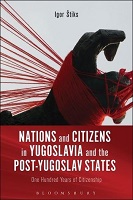Chapter 2 Revolutionary Brothers
The Communist Formula for Yugoslavia
Author(s)
Štiks, Igor
Collection
European Research Council (ERC)Language
EnglishAbstract
re complex as two parallel nationalist movements – one seeking higher Yugoslav unity, the other arguing for the separate political autonomy of ethnic groups – often complemented one another, but at other times were in open conflict. Moreover, the political and territorial ambitions entailed by the various ethnic nationalisms often collided with each other. Eventually, as elsewhere, a marriage of necessity brought the two together. Yugoslav communists had to acknowledge that nationalism was a potent political force. They thus continued searching for a political project that could successfully combine both social and national emancipation in the context of developed and often mutually exclusive national projects of neighbouring groups. In this chapter, I show how the Yugoslav communists ‘discovered’ the successful federalist formula for the socialist re unification of Yugoslavia after the Second World War as well as how, as with any ‘successful’ formula, its discovery was preceded by numerous fruitless experiments.
Keywords
second world war; federalism; anti-fascism; communists; marxism; national question; josip broz tito; second world war; federalism; anti-fascism; communists; marxism; national question; josip broz tito; Kingdom of Yugoslavia; League of Communists of Yugoslavia; Serbs; Socialist Federal Republic of Yugoslavia; South Slavs; YugoslaviaDOI
10.5040/9781474221559.ch-003OCN
1030819764Publisher
Bloomsbury AcademicPublisher website
https://www.bloomsbury.com/academic/Publication date and place
London, 2015Grantor
Classification
Society and Social Sciences
Politics and government


 Download
Download Web Shop
Web Shop